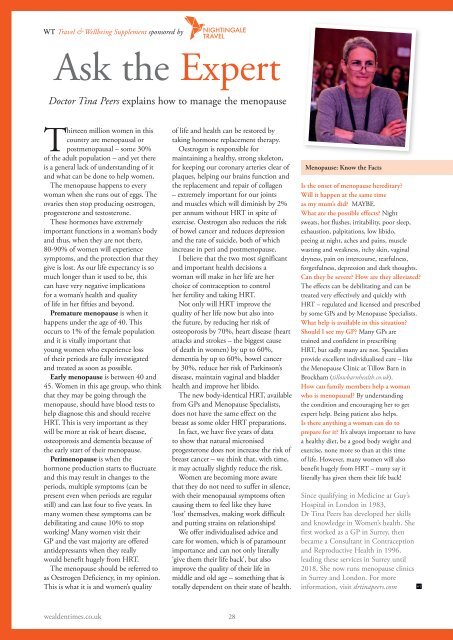Wealden Times | WT215 | January 2020 | Travel & Wellbeing supplement inside
Wealden Times - The lifestyle magazine for the Weald
Wealden Times - The lifestyle magazine for the Weald
You also want an ePaper? Increase the reach of your titles
YUMPU automatically turns print PDFs into web optimized ePapers that Google loves.
WT <strong>Travel</strong> & <strong>Wellbeing</strong> Supplement sponsored by<br />
Ask the Expert<br />
Doctor Tina Peers explains how to manage the menopause<br />
Thirteen million women in this<br />
country are menopausal or<br />
postmenopausal – some 30%<br />
of the adult population – and yet there<br />
is a general lack of understanding of it<br />
and what can be done to help women.<br />
The menopause happens to every<br />
woman when she runs out of eggs. The<br />
ovaries then stop producing oestrogen,<br />
progesterone and testosterone.<br />
These hormones have extremely<br />
important functions in a woman’s body<br />
and thus, when they are not there,<br />
80-90% of women will experience<br />
symptoms, and the protection that they<br />
give is lost. As our life expectancy is so<br />
much longer than it used to be, this<br />
can have very negative implications<br />
for a woman’s health and quality<br />
of life in her fifties and beyond.<br />
Premature menopause is when it<br />
happens under the age of 40. This<br />
occurs to 1% of the female population<br />
and it is vitally important that<br />
young women who experience loss<br />
of their periods are fully investigated<br />
and treated as soon as possible.<br />
Early menopause is between 40 and<br />
45. Women in this age group, who think<br />
that they may be going through the<br />
menopause, should have blood tests to<br />
help diagnose this and should receive<br />
HRT. This is very important as they<br />
will be more at risk of heart disease,<br />
osteoporosis and dementia because of<br />
the early start of their menopause.<br />
Perimenopause is when the<br />
hormone production starts to fluctuate<br />
and this may result in changes to the<br />
periods, multiple symptoms (can be<br />
present even when periods are regular<br />
still) and can last four to five years. In<br />
many women these symptoms can be<br />
debilitating and cause 10% to stop<br />
working! Many women visit their<br />
GP and the vast majority are offered<br />
antidepressants when they really<br />
would benefit hugely from HRT.<br />
The menopause should be referred to<br />
as Oestrogen Deficiency, in my opinion.<br />
This is what it is and women’s quality<br />
of life and health can be restored by<br />
taking hormone replacement therapy.<br />
Oestrogen is responsible for<br />
maintaining a healthy, strong skeleton,<br />
for keeping our coronary arteries clear of<br />
plaques, helping our brains function and<br />
the replacement and repair of collagen<br />
– extremely important for our joints<br />
and muscles which will diminish by 2%<br />
per annum without HRT in spite of<br />
exercise. Oestrogen also reduces the risk<br />
of bowel cancer and reduces depression<br />
and the rate of suicide, both of which<br />
increase in peri and postmenopause.<br />
I believe that the two most significant<br />
and important health decisions a<br />
woman will make in her life are her<br />
choice of contraception to control<br />
her fertility and taking HRT.<br />
Not only will HRT improve the<br />
quality of her life now but also into<br />
the future, by reducing her risk of<br />
osteoporosis by 70%, heart disease (heart<br />
attacks and strokes – the biggest cause<br />
of death in women) by up to 60%,<br />
dementia by up to 60%, bowel cancer<br />
by 30%, reduce her risk of Parkinson’s<br />
disease, maintain vaginal and bladder<br />
health and improve her libido.<br />
The new body-identical HRT, available<br />
from GPs and Menopause Specialists,<br />
does not have the same effect on the<br />
breast as some older HRT preparations.<br />
In fact, we have five years of data<br />
to show that natural micronised<br />
progesterone does not increase the risk of<br />
breast cancer – we think that, with time,<br />
it may actually slightly reduce the risk.<br />
Women are becoming more aware<br />
that they do not need to suffer in silence,<br />
with their menopausal symptoms often<br />
causing them to feel like they have<br />
‘lost’ themselves, making work difficult<br />
and putting strains on relationships!<br />
We offer individualised advice and<br />
care for women, which is of paramount<br />
importance and can not only literally<br />
‘give them their life back’, but also<br />
improve the quality of their life in<br />
middle and old age – something that is<br />
totally dependent on their state of health.<br />
Menopause: Know the Facts<br />
is the onset of menopause hereditary?<br />
Will it happen at the same time<br />
as my mum’s did? MAYBE.<br />
What are the possible effects? Night<br />
sweats, hot flushes, irritability, poor sleep,<br />
exhaustion, palpitations, low libido,<br />
peeing at night, aches and pains, muscle<br />
wasting and weakness, itchy skin, vaginal<br />
dryness, pain on intercourse, tearfulness,<br />
forgetfulness, depression and dark thoughts.<br />
Can they be severe? How are they alleviated?<br />
The effects can be debilitating and can be<br />
treated very effectively and quickly with<br />
HRT – regulated and licensed and prescribed<br />
by some GPs and by Menopause Specialists.<br />
What help is available in this situation?<br />
Should i see my GP? Many GPs are<br />
trained and confident in prescribing<br />
HRT, but sadly many are not. Specialists<br />
provide excellent individualised care – like<br />
the Menopause Clinic at Tillow Barn in<br />
Brockham (tillowbarnhealth.co.uk).<br />
How can family members help a woman<br />
who is menopausal? By understanding<br />
the condition and encouraging her to get<br />
expert help. Being patient also helps.<br />
is there anything a woman can do to<br />
prepare for it? It’s always important to have<br />
a healthy diet, be a good body weight and<br />
exercise, none more so than at this time<br />
of life. However, many women will also<br />
benefit hugely from HRT – many say it<br />
literally has given them their life back!<br />
Since qualifying in Medicine at Guy’s<br />
Hospital in London in 1983,<br />
Dr Tina Peers has developed her skills<br />
and knowledge in Women’s health. She<br />
first worked as a GP in Surrey, then<br />
became a Consultant in Contraception<br />
and Reproductive Health in 1996,<br />
leading these services in Surrey until<br />
2018. She now runs menopause clinics<br />
in Surrey and London. For more<br />
information, visit drtinapeers.com<br />
wealdentimes.co.uk<br />
28


















